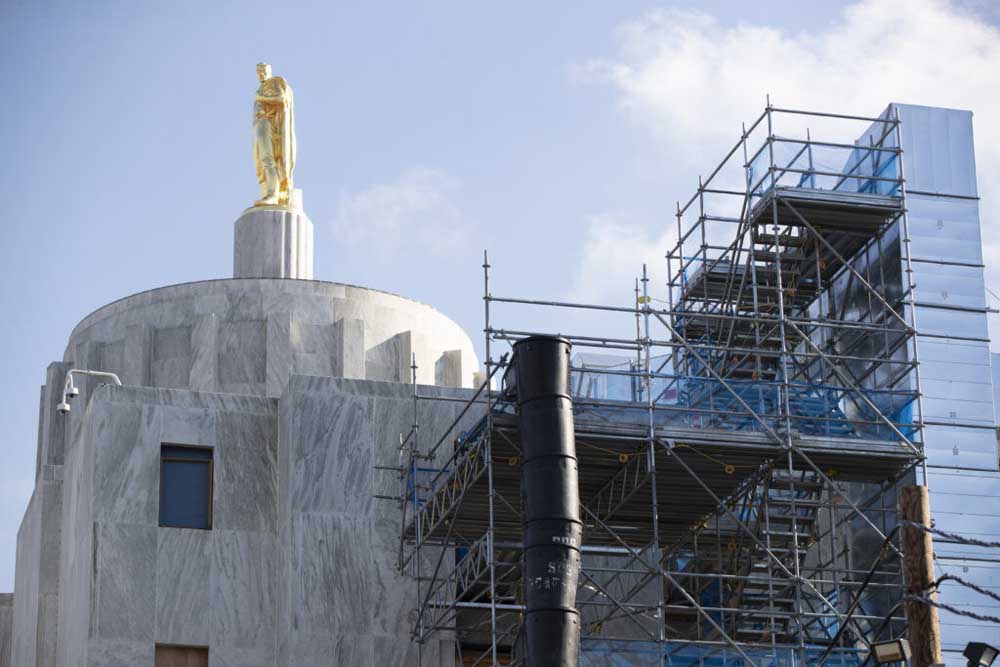Fees to record documents, register marriages would rise if lawmakers cede to county clerks’ pleas
Published 8:22 am Tuesday, February 4, 2025

- Construction at the Oregon State Capitol in Salem in 2023.
Oregon county clerks on Monday asked lawmakers to increase how much money clerks can charge members of the public to locate records, register marriage licenses and record official documents.
County clerks’ offices need the money, several of them testified, to fund elections and other county services at a time when their budgets are suffering. Those budgets rely heavily on fees for recording documents, like mortgages, clerks said, and that income stream has declined as fewer people have bought homes or refinanced their properties amid high interest rates.
“We have self sustained really up until the last couple years, when inflation became a problem and of course interest rates just skyrocketed,” said Jackson County Clerk Chris Walker. “We are funded hugely dependent on the economy and the housing market.”
The bill was one of five that county clerks proposed to the House Committee on Rules Monday. Others would adjust clerk workloads and tweak who can help with elections.
The clerks’ concerns echoed a report on election staffing conducted by Reed College in 2023 on behalf of the Secretary of State’s office. That report found that clerk’s offices were “understaffed and underfunded headed into the 2024 presidential election cycle,” the Oregon Capital Chronicle reported.
Lawmakers held a public hearing on the county clerks’ proposals Monday but did not vote on whether to advance the bills.
House Bill 3383 would increase the charge for a records search or an official certificate from $3.75 to $5, change the cost to register a marriage license from $25 to $35, increase the document recording fee from its current level of $5 a page to $10 for the first page and $5 for the rest, and increase the fee to record oversized or otherwise non-standardized documents from $20 to $30.
The majority of county clerk offices pay for their functions using only user fees, not general taxpayer dollars, said Rochelle Long, president of the Oregon Association of County Clerks. While state statute says county general funds should pay for elections, recording funds collected by clerks’ offices actually pay for them in many offices statewide, Long said. When those funds are down, clerk’s offices end up cutting staff and multitasking, which can lead to errors, Long said.
Some lawmakers questioned whether the intent of the fees had shifted from covering costs of printing or digitizing documents to supporting the operations of the clerk’s offices. Rep. Lucetta Elmer, a McMinnville Republican, called it “irritating” for private citizens to pay more in property taxes each year just to get charged more at the county clerk’s office for services that people expect their tax dollars are paying for.
“It’s costing your local taxpayers more money and they’re going to be more grumpy about that than anyone,” Elmer said. “But I understand what you’re saying … you’re just trying to find the money to do your job.”
Workload-oriented bills to allow clerks to delay processing initiatives or referendums at the same time they’re trying to run an election and to allow deputy clerks to conduct marriage ceremonies, freeing up time for the chief clerk, got little pushback from lawmakers.
But a bill that would allow certain political party officials to help county clerks count ballots raised concern.
Under Oregon law, most candidates who appear on the ballot can’t work or volunteer for the county clerk opening or counting ballots. The bill would amend the law to let a precinct committee person volunteer to do that work. Precinct committee people don’t hold public office but serve in low-level positions within the Democratic or Republican party and are elected by members of those respective parties on separate ballot sheets mailed out with regular ballots during primary elections.
Harney County Clerk Dag Robinson told lawmakers that the state’s restrictions make it hard for clerks in small counties to find enough temporary election workers, since there’s typically a “rather small, engaged group to choose from.”
Robinson told lawmakers that former elections workers who decide to run for precinct committee positions have been prohibited from helping despite their historical training. He also argued the state has a “multitude of security measures” in place to provide for fair and accurate elections.
House Republican Leader Christine Drazan flagged immediate concerns about allowing precinct committee people to volunteer to make ballot determinations.
“They’re party activists. They care deeply about these issues,” she said. “I don’t love the idea of them being volunteers and opening ballots and counting ballots and doing this work.”
Robinson said the intent of the bill was to allow people running for those precinct positions to be officially employed by the clerk’s office, not to volunteer, and said the bill may need an amendment to clarify that language.








